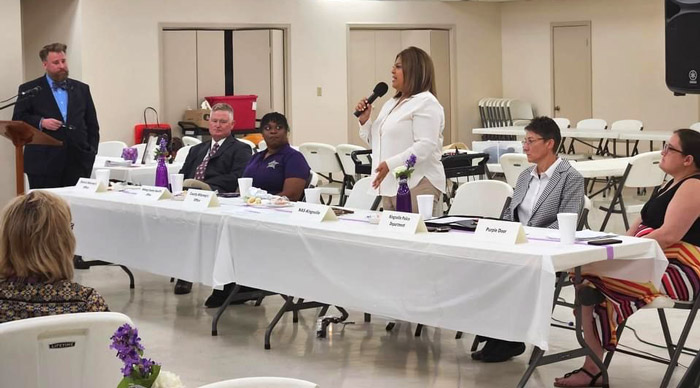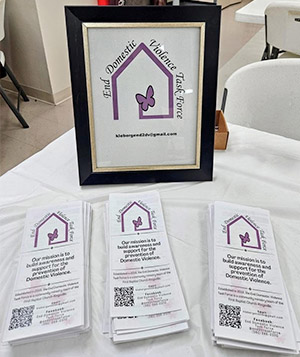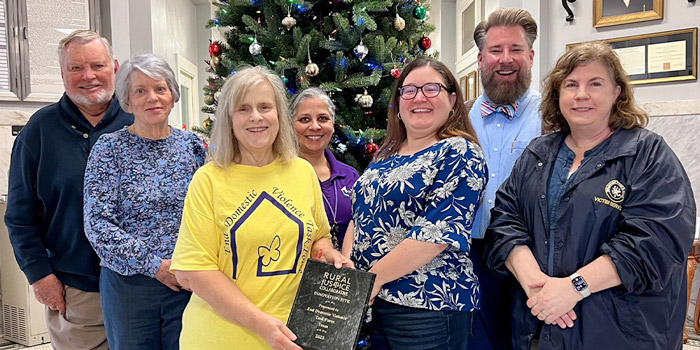Kingsville End Domestic Violence Task Force
- Need: Support for people experiencing domestic violence in Kingsville, Texas and the surrounding area.
- Intervention: A grassroots task force leading a series of initiatives that include a court accompaniment program, trusted partner trainings for community members, and a hotel voucher program for emergency shelter.
- Results: More than 100 people have been trained in the trusted partner program, and at least a dozen hotel vouchers have been utilized.
Description
In 2018, pastors in the Kingsville Ministerial Alliance in Kingsville, Texas, realized that there were gaps in services and a lack of support for local agencies working to address domestic violence. With the nearest shelter fifty miles away – a distance that was prohibitive for people without transportation, or those whose jobs or school-aged children required them to stay closer to home – police officers were pooling their own money to place victims in local hotels for their safety. To address this challenge and others, local agencies including law enforcement, the county attorney's office, and The Purple Door, a regional domestic violence organization, came together to create the End Domestic Violence Task Force. This communitywide initiative provides enhanced support for domestic violence survivors and spreads public awareness of the issue.
The task force is sponsored by the First Baptist Church of Kingsville and is primarily funded through donations.

Services offered
The End Domestic Violence Task Force has launched a number of initiatives since 2018. They include:
Hotel voucher program: To address the lack of emergency shelter options nearby, the task force created a hotel voucher program in which law enforcement officers can direct survivors in need of immediate shelter to a hotel in Kingsville. Survivors are encouraged to get in touch with The Purple Door within the next day or two to learn about their options going forward.
Court accompaniment program: Survivors can opt to have members of the task force accompany them to court hearings to show their support.

Trusted Partners, Trusted Locations: This program trains local businesses and organizations, as well as individual community members, in how to recognize signs of domestic violence and how to access local resources. Participating "trusted locations" range from churches to hair salons. To signal that they are a safe space where a person experiencing domestic violence can go to confide in someone and learn about their options, a "trusted location" will typically display a small sticker on their door or in a more discreet location inside.
Public awareness and education: The task force hosts educational events in the community to teach people about the realities of domestic violence and the local resources available.
Results
More than 100 individuals have been trained as "trusted partners," and an estimated 15-20 businesses have been designated as "trusted locations." At least a dozen hotel vouchers have been utilized.

Challenges
Reviving group participation and energy after the COVID-19 pandemic has been a challenge for the task force. Educating the public about the nuances of domestic violence and why the task force is needed has also been challenging at times.
Replication
Building relationships with and supporting people and organizations in Kingsville who were already working in the domestic violence space, such as local law enforcement and nonprofits, has been key to the task force's success.
Contact Information
J. Dean Craig, SecretaryEnd Domestic Violence Task Force
jcraig@co.kleberg.tx.us
Topics
Abuse and violence
· Access
· Community and faith-based initiatives
States served
Texas
Date added
August 8, 2024
Suggested citation: Rural Health Information Hub, 2024 . Kingsville End Domestic Violence Task Force [online]. Rural Health Information Hub. Available at: https://www.ruralhealthinfo.org/project-examples/1146 [Accessed 19 December 2025]
Please contact the models and innovations contact directly for the most complete and current information about this program. Summaries of models and innovations are provided by RHIhub for your convenience. The programs described are not endorsed by RHIhub or by the Federal Office of Rural Health Policy. Each rural community should consider whether a particular project or approach is a good match for their community’s needs and capacity. While it is sometimes possible to adapt program components to match your resources, keep in mind that changes to the program design may impact results.
